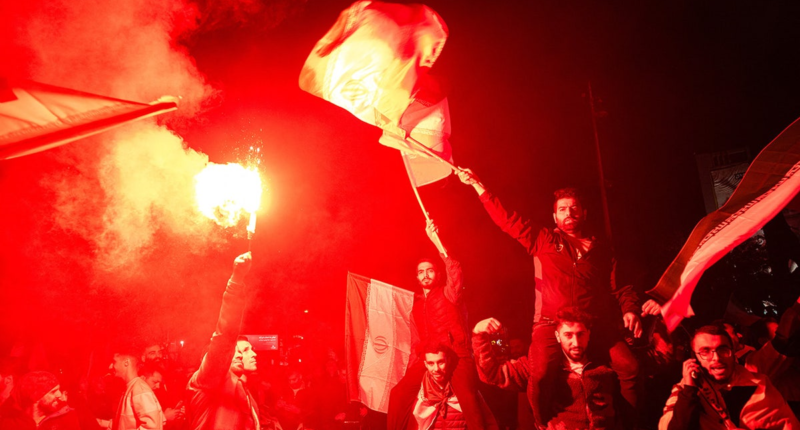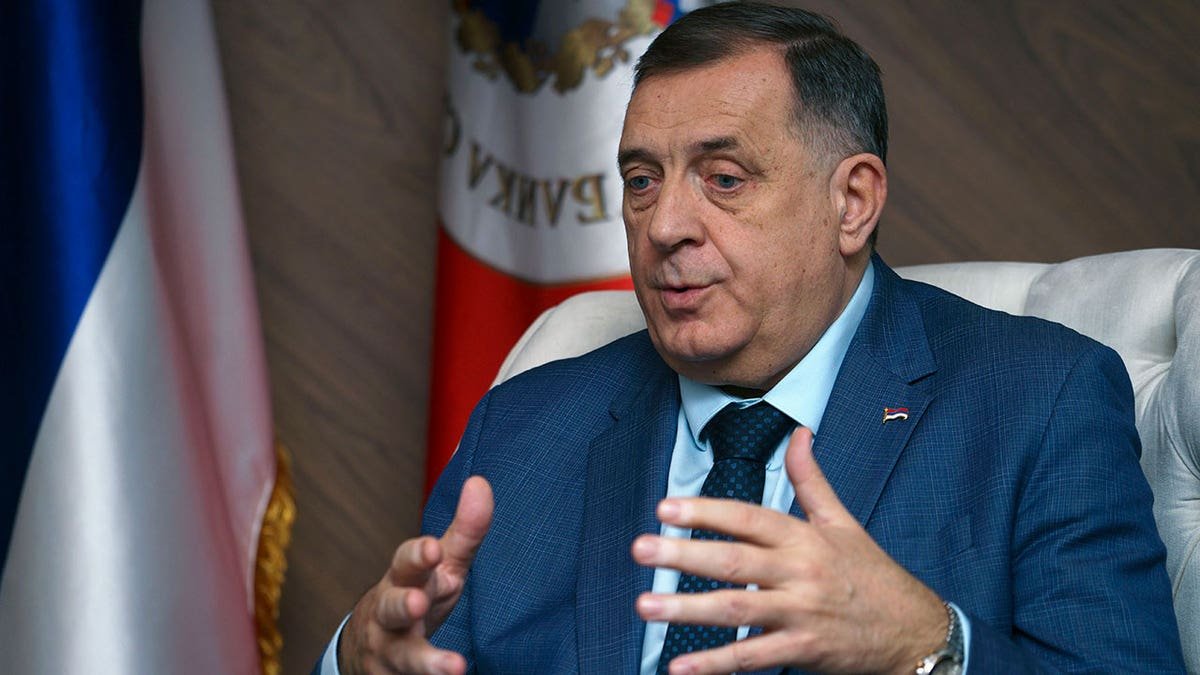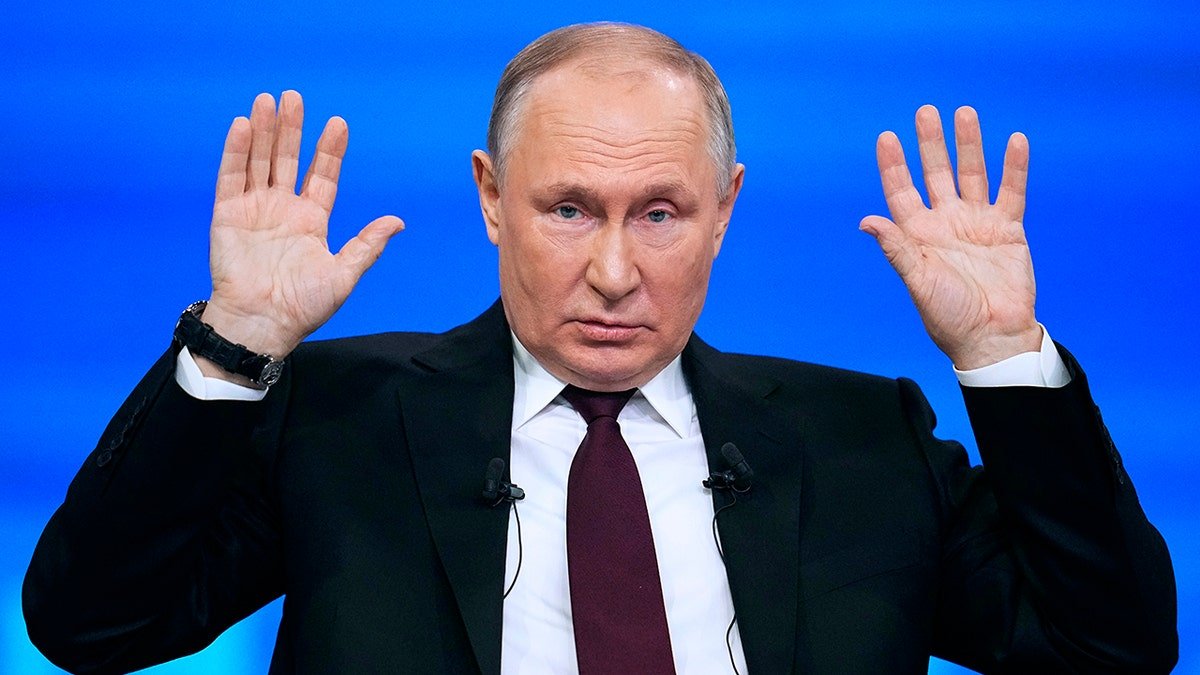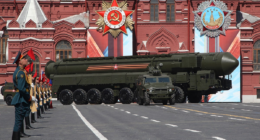Security officials in Israel and the U.S. have been scrambling for days to bolster the Jewish state’s defenses following the back-to-back assassinations of Hezbollah and Hamas terror leaders last week.
Iran on Monday gave credence to security concerns after it claimed stability in the region could only be achieved by “punishing” Israel for its alleged assassination of Hamas leader Ismail Haniyeh in Tehran.
Though an attack on Israel would only mark the second time Iran has directly hit it, despite years of aggressive rhetoric and force posture, it plays in to Tehran’s long-held “ring of fire” strategy to encircle Israel with militant forces and engage in hostilities against the Jewish state.
“The Ring of Fire strategy… is not designed to be theoretical. It’s how the regime fights its ‘death by a thousand cuts’ strategy against Israel,” Behnam Ben Taleblu, Iran expert and senior fellow with the Foundation for Defense of Democracies (FDD), told Fox News Digital.
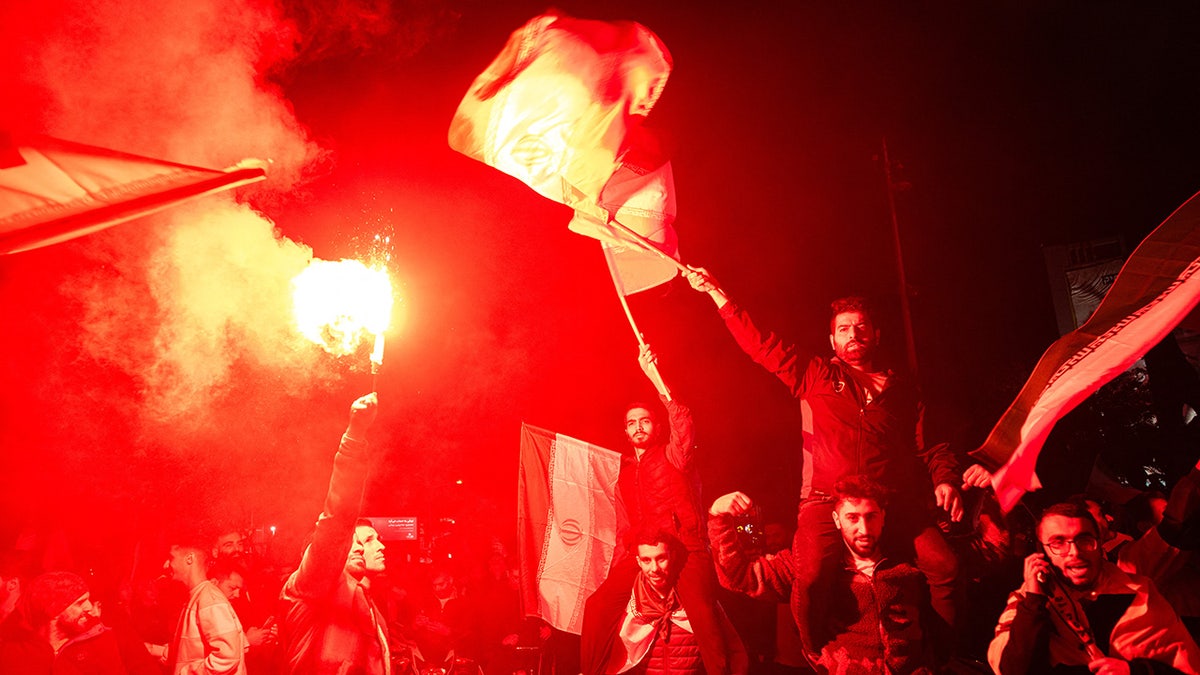
Pro-government supporters gather at Palestine Square in Tehran, on April 14, 2024, in a celebration of Iran firing hundreds of drones and missiles at Israel on April 14, 2024. (Hossein Beris/Middle East Images/AFP via Getty Images)
ISRAELIS REMAIN CALM AND CARRY ON IN FACE OF IRANIAN THREAT
Taleblu pointed to how nearly every militant and terrorist organization in the area surrounding Israel is not only backed by Iran but has access to an array of Iranian armaments, including rockets, mortars, drones, cruise missiles and, in some cases, ballistic missiles.
“What the regime is likely to try to do,” Ben Taleblu continued, “is to go for a 360-degree attack-vector trying to strike Israel from both sides.”
Tehran has long relied on proxy groups in the Middle East to fight its battles without Iranian troops having to get directly involved in lengthy and deadly wars.
Iran has provided funding, training and or weapons to at least 19 terrorist organizations spread out across Gaza, the West Bank, Lebanon, Syria, Iraq and Yemen, according to open-source findings by the FDD.

Iran launches a missile in an unknown location, in a picture received Aug. 20, 2020. (West Asia News Agency via Reuters)
Some groups have received vast amounts of support, including Hezbollah, which receives $700 million annually, and Hamas, which receives $100 million each year, along with the tens of millions also sent to the Islamic Jihad, according to figures cited by Israeli Defense Minister Yoav Gallant.
“The Iraqi militias, the Syrian militias and the Houthis, within the last decade, have really begun to become a key part of Iranian strategy,” Bill Roggio, senior fellow at the FDD and founding editor of “The Long War Journal,” also told Fox News Digital. “They’re not paying the human cost for their involvement.
“The Iranians, they could play this game all day long,” he added.
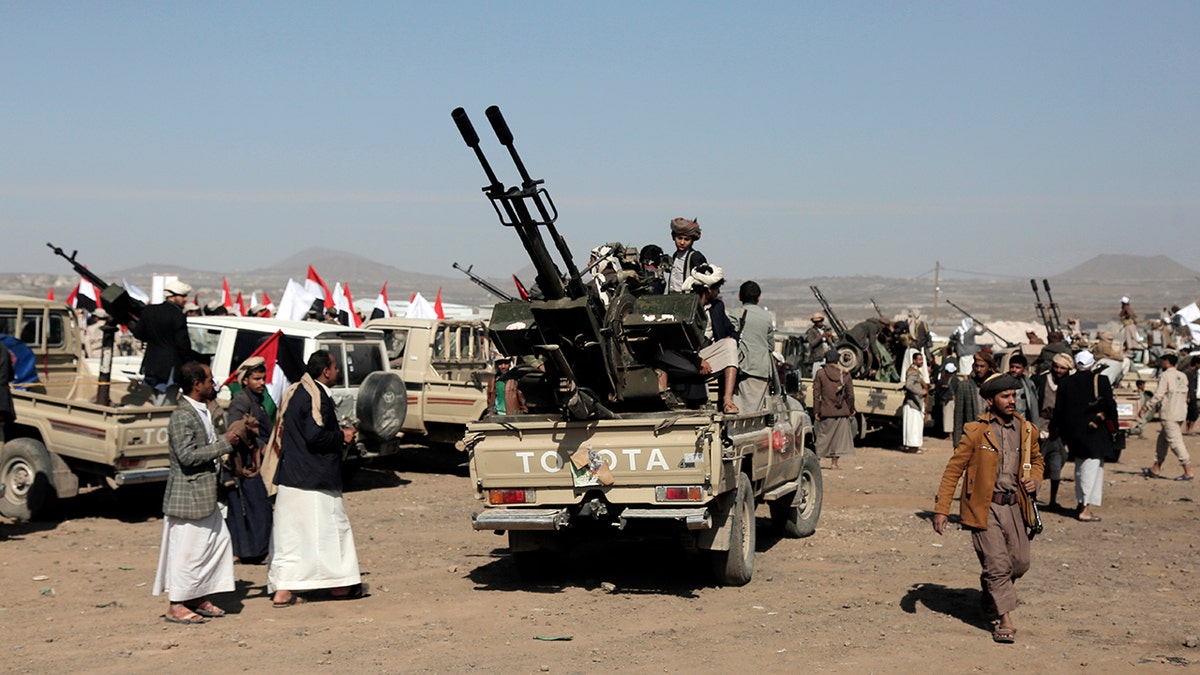
Houthi fighters man heavy machine guns mounted on vehicles at a rally in support of Palestinians in the Gaza Strip. (Mohammed Hamoud/Getty Images)
ISRAEL CONSIDERS PREEMPTIVE STRIKE ON IRAN AS TENSIONS ESCALATE: REPORT
Both security experts pointed out that the U.S. and Israeli strategy has been to respond to Iranian attacks through more sophisticated methods, signaling they can create pains for the Islamic Republic at a much lower cost to them than Tehran is capable of achieving.
But this approach has also led Tehran to believe that neither nation will respond with the same level of force that Iran is willing to throw at Israel in particular.
On Monday, Iranian foreign ministry spokesperson Nasser Kanaani claimed that “Iran seeks to establish stability in the region, but this will only come with punishing the aggressor and creating deterrence against the adventurism of the Zionist regime.”
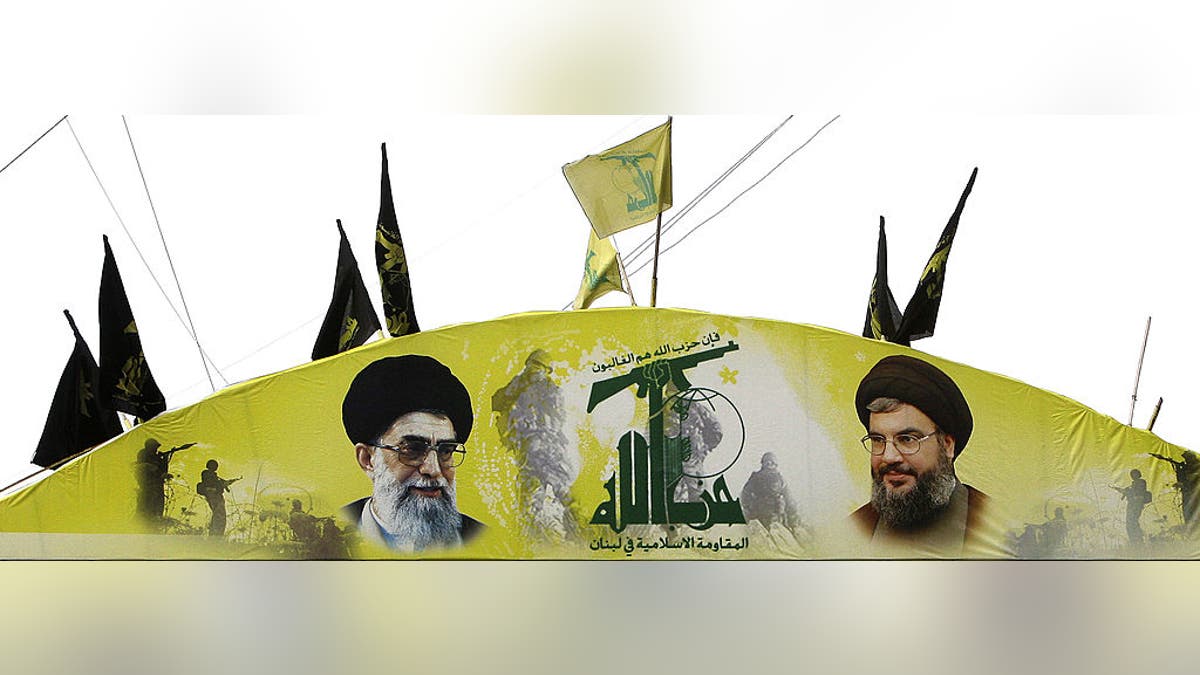
An arch glorifying Hezbollah features pictures of its chief Hassan Nasrallah and Iran’s spiritual leader, Ali Khamenei, in a Beirut suburb, Jan. 16, 2011. (Anwar Amro/AFP via Getty Images)
Israeli officials have been readying their defensive and offensive capabilities on the ground and in the air as security officials around the globe await Iran’s imminent attack.
“It seems to be… a matter of when, and not if,” Ben Taleblu said.
Iran issued its first direct assault on Israel in April after the IDF hit an Iranian consulate in Syria and killed 13 people, including Brig. Gen. Mohammad Reza Zahedi, an Islamic Revolutionary Guards Corps (IRGC) senior commander, and his deputy, Gen. Mohammad Hadi Hajriahimi.
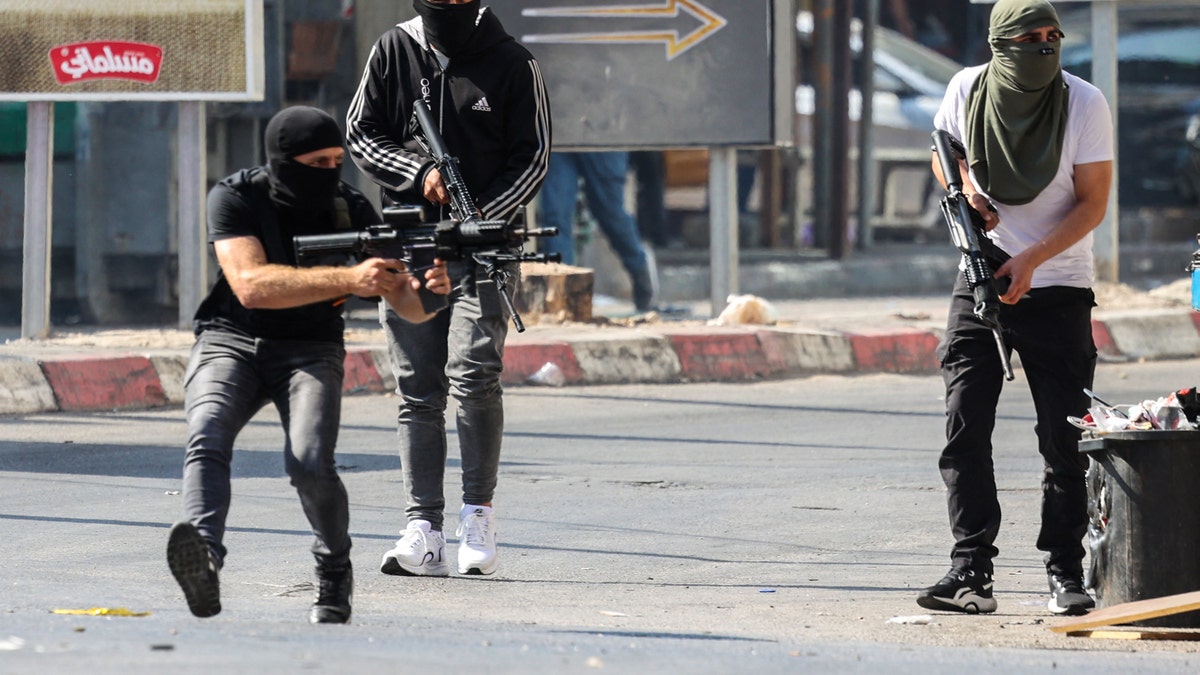
Palestinian terrorists take up position during a confrontation with the Israeli army in Jenin on July 3, 2023. (Jaafar Ashtiyeh/AFP via Getty Images)
BIDEN TO MEET WITH NATIONAL SECURITY TEAM AHEAD OF ANTICIPATED IRANIAN ATTACK AGAINST ISRAEL
In response, Tehran levied some 300 rockets and drones at Israel, causing minor damage, and no Israeli deaths were reported as 99% of the strikes were intercepted.
Taleblu said the April attack was a balancing act as Tehran looked to simultaneously respond with force but without escalating to an all-out regional conflict.
But this time officials believe Iran has something to prove following the assassination of Haniyeh on Iranian soil through a sophisticated bombing scheme, which is believed to have taken months in planning and preparation.
“It highlighted the level of penetrability in Iran’s security services given that this was a pre-placed bomb that was able to be remotely detonated,” Taleblu said. “They’re trying to make up for that embarrassment.”
Israel has not taken responsibility for the killing of Haniyeh, but Iran and Hamas have accused Jerusalem of carrying out the attack and pledged to retaliate.
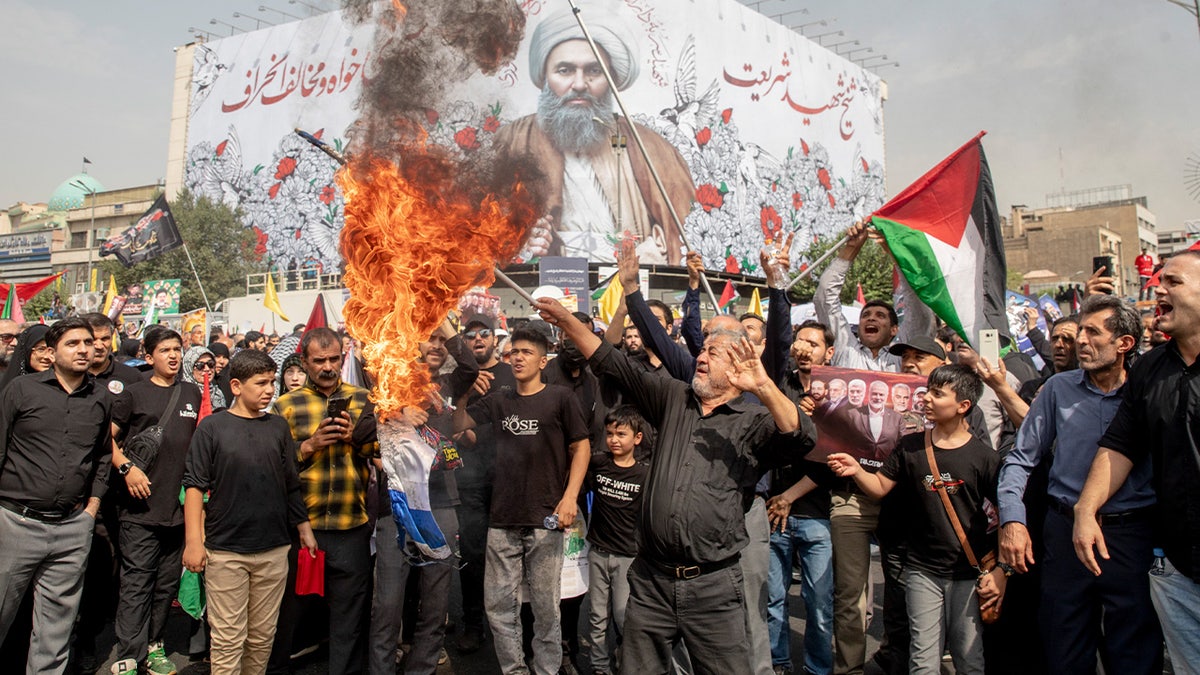
Iranians burn a representation of the Israeli flag during the funeral ceremony of Hamas leader Ismail Haniyeh and his bodyguard on Aug. 1, 2024, in Tehran. (Majid Saeedi/Getty Images)
CLICK HERE TO GET THE FOX NEWS APP
Officials believe that this time Iran may try to overwhelm Israeli and American defenses in a multipronged attack using not only more advanced IRGC munitions but by relying on a layered approach with its regional proxy forces sitting in wait on Israel’s borders.
“The Iranians have fought a four-plus decade-long shadow war against the Israelis and the Americans,” Taleblu said. “And the trend line indicates that they feel increasingly comfortable coming out of the shadows.”
“That’s a problem for everyone who wants less conflict in the region,” he warned.
